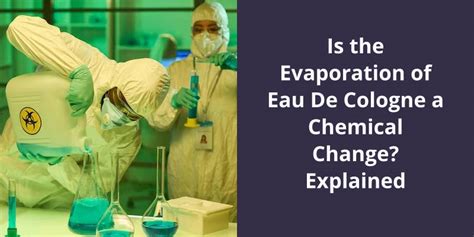Cologne: Understanding Its Evaporation Process
Cologne, a beloved fragrance for centuries, relies on a complex interplay of factors to release its scent into the air. Understanding the evaporation process of cologne is key to appreciating its longevity and the nuances of its scent profile. This article delves into the science behind how cologne evaporates, exploring the role of different ingredients, environmental conditions, and application techniques.
What is Cologne and What Makes it Evaporate?
Cologne, a diluted form of perfume, typically contains a lower concentration of fragrant oils compared to eau de parfum or perfume. This lower concentration directly influences its evaporation rate. The primary component driving evaporation is the solvent, usually a mixture of alcohol (typically ethanol) and water. These volatile liquids readily transition from a liquid to a gaseous state, carrying the fragrant oils with them. The evaporation process is governed by several key principles:
-
Vapor Pressure: Each component in the cologne has its own vapor pressure – the tendency to evaporate. Alcohol, being highly volatile, evaporates quickly, carrying the fragrance oils along for the ride. Water, less volatile, evaporates more slowly. The blend of these components determines the overall evaporation rate of the cologne.
-
Surface Area: A larger surface area exposed to the air increases the rate of evaporation. This explains why applying cologne to pulse points (areas with higher blood flow and therefore more heat) leads to a more noticeable and longer-lasting scent. The warmth accelerates evaporation, releasing the fragrance.
-
Temperature: Higher temperatures increase the kinetic energy of molecules, leading to faster evaporation. A hot and humid environment will cause cologne to evaporate more rapidly than a cool, dry one.
-
Humidity: High humidity slows down evaporation. The air is already saturated with water vapor, reducing the capacity for more water (and the alcohol carrying the fragrance) to evaporate.
How Different Cologne Ingredients Affect Evaporation
The composition of a cologne significantly impacts its evaporation profile. Different fragrance oils have varying volatilities.
-
Top Notes: These are the lighter, more volatile oils that evaporate quickly, providing the initial burst of scent. Citrus notes, for example, typically evaporate rapidly.
-
Heart Notes: These are the medium-volatility oils that emerge after the top notes have faded, forming the core of the fragrance. Floral and spice notes often fall into this category.
-
Base Notes: These are the heavier, less volatile oils that provide the long-lasting foundation of the scent. Woody, musky, and amber notes are examples of base notes. They evaporate much more slowly, often remaining on the skin for several hours.
How to Make Your Cologne Last Longer
Several strategies can help prolong the longevity of your cologne:
-
Apply to Pulse Points: As mentioned earlier, applying cologne to pulse points (wrists, neck, behind the ears) maximizes the scent's diffusion due to the increased body heat.
-
Moisturize Your Skin: Applying a moisturizer before cologne helps the fragrance adhere better to the skin and slows down evaporation.
-
Store Properly: Keep your cologne in a cool, dark place away from direct sunlight and heat, which can degrade the fragrance and accelerate evaporation.
-
Choose the Right Concentration: Eau de parfum and perfume have higher concentrations of fragrance oils and therefore tend to last longer than cologne.
-
Consider the Season: Hot, humid days will cause cologne to evaporate more rapidly. You may need to reapply more frequently during warmer months.
What Affects the Scent's Longevity?
Several factors beyond the evaporation process affect how long you perceive the scent:
-
Your Skin Type: Oily skin tends to retain fragrance longer than dry skin.
-
Your Body Chemistry: Individual body chemistry can alter how a fragrance interacts with the skin and how it evolves over time.
-
The Fragrance Itself: The quality and composition of the fragrance oil blend itself play a significant role in the longevity of the scent.
Why Does Cologne Smell Different Over Time?
The changing scent of cologne over time is directly related to the evaporation process and the different volatilities of its components. The top notes evaporate first, revealing the heart notes, and finally, the base notes emerge, providing the long-lasting signature of the fragrance. This evolution of the scent is part of the appeal of many colognes.
This comprehensive overview of the evaporation process of cologne provides a deeper understanding of the science behind this beloved aromatic experience. By understanding these factors, you can better appreciate and enjoy your favorite cologne.

